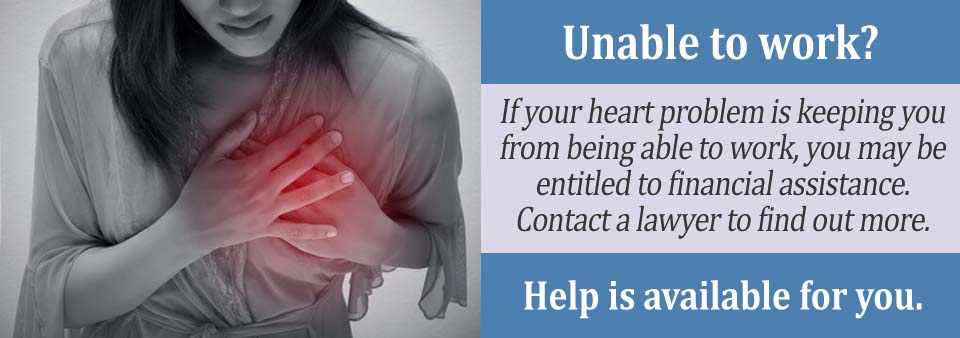More than 40% of deaths in the United States are caused from heart disease, a statistic which far outnumbers that of other dreaded diseases, including all of the forms of cancer combined.
Because of that, let's take a closer look at this this serious group of diseases to gain new understanding about their causes, symptoms, treatments, and prevention.
What Heart Diseases Qualify for Disability?
Heart problems that qualify for disability include:
- chronic heart failure,
- atrial fibrillation,
- heart failure,
- cardiomyopathy,
- Ischemic heart disease,
- symptomatic congenital heart disease,
- arrhythmias,
- peripheral arterial disease,
- chronic venous insufficiency.
You may be eligible to receive $3,627 each month. Fill out this Free Disability Evaluation today to find out more!
The SSA’s Blue Book, which is the list of conditions that qualify for disability and in which qualify for Social Security disability benefits has an entire section on the cardiovascular system.
Is heart disease a disability? Yes. The cardiovascular system is located in section 4.00 of the SSA’s Blue Book and it lists all the heart diseases in which the SSA considers a “cardiovascular ailment”.
 The SSA defines a cardiovascular ailment as any disorder that affects the proper functioning of the heart or the circulatory system. That section outlines all the heart diseases that qualify for disability.
The SSA defines a cardiovascular ailment as any disorder that affects the proper functioning of the heart or the circulatory system. That section outlines all the heart diseases that qualify for disability.
It will also tell you what the SSA looks for when you send in your application for that heart disease, including what medical evidence and tests to prove that your heart disease is disabling enough that you will be out of work for at least 12 months.
When you send in your disability application for heart disease, the SSA will match your application and supporting medical evidence and try to match one of the listings in the cardiovascular system section of the Blue Book.
If you meet one of the listings and you have earned enough work credits, you will qualify for Social Security disability benefits with heart disease.
What is Heart Disease?
Heart disease is another term for cardiovascular disease, or diseases which affect the cardiovascular system including the heart and its network of arteries, veins and capillaries.
The term cardiovascular disease is often used for coronary artery disease, the most common form of cardiovascular disease in the United States, and the condition in which blood vessel blockages create the potential for heart attacks and other heart problems.
Cardiovascular disease also refers to other disabling conditions such as abnormal heart beats, infections, and defects.
The causes of heart disease vary depending on the specific condition, but include atherosclerosis, or hardening of the arteries due to plaque from fatty foods, high blood pressure and cholesterol, as well as genetic factors such as birth defects.
Types of Symptoms
Often the symptoms of heart disease come on suddenly, in the form of a heart attack or cardiac arrest, but if detected early enough, can be treated to prevent further damage or risk of heart failure.
The most common symptoms of heart disease are chest pain, difficulty breathing, and pain, numbness, weakness, or coldness in the extremities due to insufficient blood flow.
Treatments for heart disease include diet and exercise, medications, blood thinners to prevent heart attacks and strokes, and when severe enough, surgery to remove blockages or treat defects.
Cardiovascular diseases can become severely disabling. If you or someone you know is suffering from a form of heart disease, you may qualify for disability.
Cardiovascular disease is listed under Section 4 of the Blue Book Listing of Impairments and includes subcategories which list specific conditions the SSA recognizes as potentially disabling. Each condition lists the specific symptoms required to qualify as a disability.

How Can I Get Disability Benefits For a Heart Problem?
Serious heart problems may be disabling enough to prevent someone from continuing their participation in gainful employment. If this is the case, the Social Security Administration (SSA) may provide disability benefits payments to people who have serious heart problems if they match the criteria necessary for benefits payments’ approval.
The main criteria that must be met are listed below:
- The symptoms of the heart problem must match the description in the SSA’s Blue Book listing under Section 4.00 – Cardiovascular System. Basically, the Blue Book listing defines what the SSA regards as conditions serious enough to justify disability payments being made.
- There needs to be sufficient medical evidence to support the application for benefits. This should include the applicant’s medical history, how the heart problems developed and what treatment was given, results of tests and scans showing the severity of the heart problems; any surgery that has been performed; a prognosis showing future expectations and possibilities for further treatment and medications prescribed.
- The applicant must be able to show that gainful employment for at least the following 12 months is not possible because of the disability. The applicant may benefit from having a Residual Functional Capacity (RFC) assessment made which can show that the applicant can or cannot perform certain physical or mental tasks.
- The applicant must have accumulated sufficient work credits obtained throughout their previous employment career to obtain benefits via the SSDI (Social Security Disability Insurance) pathway. Work credits are obtained through payroll tax contributions. If applicants do not have enough work credits, they may also apply for benefits via the SSI (Supplemental Security Income) pathway, however, this pathway is reserved only for those who have few assets and minimal income.
Cardiovascular Diseases Listed in the Blue Book
- Chronic heart failure– occurs when the heart is unable to supply enough blood to the body because it has become weakened due to heart attacks or defects, faulty functioning of the heart’s ventricles, or high blood pressure. It often leads to severe fluid retention, known as congestive heart failure.
- Ischemic heart disease – occurs when the heart muscle is unable to get a sufficient blood supply; its usual cause is coronary heart disease.
- Recurrent arrhythmias – abnormal heart rates, either too fast or slow, which may cause fainting or cardiac arrest.
- Symptomatic congenital heart disease – birth defects in the heart which cause malfunctions.
- Heart transplant – heart replacement due to heart disease which qualifies as a disability up to 1 year.
- Aneurism of aorta or branches – swelling in the major arteries of the heart due to heart disease.
- Chronic venous insufficiency – circulation problem due to damaged veins, usually in the legs.
- Peripheral arterial disease – impaired function of outlying arteries.
If you have been severely affected by heart disease in the form of these conditions, you may qualify for disability benefits.
You might also want to seek out the help of a disability lawyer or a disability advocate They will help you get all of your medical documentation in order to give you the best chance of winning your case. A disability lawyer will also be able to tell you how much disability you can get.
What is the Blue Book Listing for Heart Failure?
The blue book listing for heart failure is located in section 4.02 of the blue book under the listing for chronic heart failure. The SSA characterizes chronic heart failure the inability of the heart to pump enough oxygenated blood to body tissues.
The SSA categorizes two kinds of chronic heart failure that qualify for Social Security disability benefits, those are predominant systolic dysfunction and predominant diastolic dysfunction.
If you have heart failure and it keeps you from working for at least 12 months, when you send in your application for Social Security disability benefits, the SSA will match your application and listing to the chronic heart failure listing, and if they believe that your heart failure is severe enough that you will be out of work for at least 12 months, then you will be able to qualify for Social Security disability benefits.
Do Heart Stents Qualify for Disability?
Heart stens alone do not qualify someone for Social Security disability benefits. However, if you have heart stens and you are unable to work full time because of it, you still may be able to qualify for Social Security disability benefits.
When you send in your application for Social Security disability with heart stens, the SSA may find that you meet another one of the cardiovascular disorders’ listings. If you match one of those listings and meet the work requirements, you will be able to qualify for Social Security disability benefits.
You also could have your doctor fill out a residual functional capacity assessment. The RFC assessment shows how much you can do and cannot do given your current health status. If it is shown that you are unable to work full time, then you may be able to qualify for Social Security disability benefits.
Work History
 The requirements for Social Security disabilities also includes a financial criterion. That does not mean that candidates need to pay a certain amount of money to apply, it actually means that your salary and job background will decide which program(s) you will apply for.
The requirements for Social Security disabilities also includes a financial criterion. That does not mean that candidates need to pay a certain amount of money to apply, it actually means that your salary and job background will decide which program(s) you will apply for.
For example, a history of work showing repeated Social Security tax contributions may qualify you for Social Security Disability Insurance.
On the other hand, you may be qualified for Supplemental Security Income (SSI) if you have a lack of both work history and income. It is also advised that you organize any documents you have on hand to demonstrate your condition to the SSA.
Residual Functional Capability for Heart Diseases
If the SSA decides that you do not meet Blue Book listing criteria, you may still be determined disabled based on your Residual Functional Capability (RFC). Given your physical limits the RFC explains the most you can do.
 You'll be given an RFC level of sedentary work, light work, or medium work based on the restrictions your doctor has given you. If SSA determines that you are restricted from performing any amount of full-time work based off your RFC, you may receive a medical vocational allowance.
You'll be given an RFC level of sedentary work, light work, or medium work based on the restrictions your doctor has given you. If SSA determines that you are restricted from performing any amount of full-time work based off your RFC, you may receive a medical vocational allowance.
It is important that you send all of your related medical documents, including medical evaluations, from your primary care provider and your cardiologist, to illustrate the severity of your physical disabilities.
The amount of movement that causes symptoms for you, such as exhaustion, breathing difficulty, or angina, is important to your RFC evaluation, and you should request your medical doctors to give guidance about your work-related limits, in particular your capacity to stand, sit, walk, carry, lean, stoop and climb.
How to Apply?
To file for SSDI, you can go online and apply on the SSA's website. To avoid denied benefits, include how your cardiac disease impacts your ability to exercise, work, and take care of your everyday needs in your submission. This, perhaps, could be one of the most important signs your disability claim will be approved. Should you have any other medical issues, please mention them in your form. Considering applying for Social Security disability benefits but not sure how much you’ll earn per month? Our Social Security Benefits Calculator can help you determine how much you’ll receive from the SSA before you file for disability
For example, diabetes, obesity, and high blood pressure are typical in people with heart failure or heart disease. In addition, it is not unusual for people who have had a heart attack to develop anxiety disorders. If you have experienced a panic attack, you should visit a psychologist or therapist and include information about your anxiety.